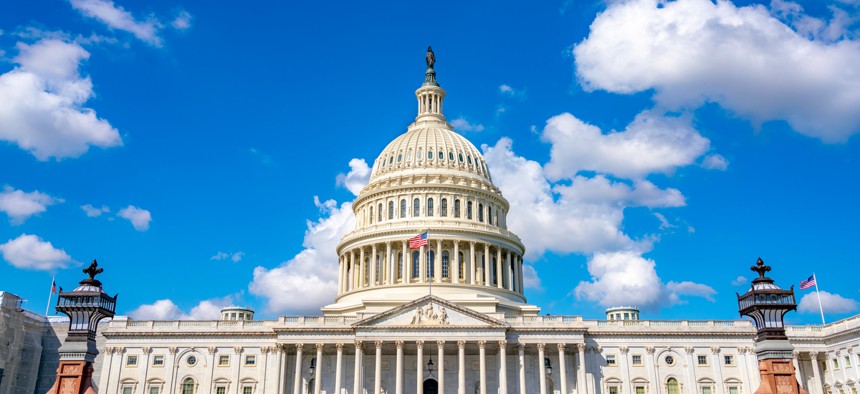Connecting state and local government leaders
The bill would allot $25 billion to expand testing capacity. While no new money was provided for states and localities, lawmakers said the Trump administration will give them flexibility in how other federal funds can be used.
A $484 billion interim coronavirus relief package passed by the Senate on Tuesday contains $25 billion to expand testing capacity across the country, a measure public health officials said will be necessary to reopen the nation.
The legislation sends $11 billion directly to states to bolster their testing capabilities and will also require the Trump administration to devise a national testing strategy.
Passage of the interim bill comes after Republicans and Democrats struggled for more than a week to reach an agreement on spending priorities as lawmakers sought to replenish a new loan program for small businesses.
While the aid package addresses several funding areas sought by Democrats, it does not include direct funding for state and local governments. State and local government leaders have complained that with stay-at-home orders in place, millions of workers filing for unemployment, and the U.S. economy at a standstill, they will need support from the federal government to offset the steep loss in tax revenues.
Senate Minority Leader Chuck Schumer said that while the bill does not include new funding for states, the Trump administration has promised to give state and local government flexibility in how they can spend other federal funding, including $150 billion allotted through the CARES Act.
“We got a commitment from President Trump and [Treasury] Secretary Mnuchin that they will be able to use their state and local money to deal with revenue losses,” Schumer said at a press conference after the Senate vote. This would provide some relief to states and localities, as advocates have complained in recent weeks that the CARES Act funding could only be used to cover coronavirus-related spending.
The interim legislation, which is expected to be taken up by the House on Thursday, would increase funding to support struggling businesses through the now-depleted Paycheck Protection Program by $320 billion, boost a separate economic disaster loan program by $60 billion, and direct $75 billion to hospitals.
Congress authorized the Paycheck Protection Program, which offers forgivable loans to small businesses under the agreement they do not lay off workers, through the CARES Act. But the Small Business Administration quickly burned through the original $350 billion allocated to the program and ran out of money last week.
The program has come under fire in recent days, as critics noted that big national restaurant and hotel chains received large sums, while smaller businesses struggled to access the funding. Treasury Secretary Steven Mnuchin said Tuesday that large businesses would not be allowed to receive money through the fund and President Trump said he would ask large businesses that received money in the first go-round to return it.
Speaking on the Senate floor on Tuesday, Senate Majority Leader Mitch McConnell said the program is saving jobs and keeping people working.
“This is even more money than we had first requested,” he said. “In the intervening time, and at our request, this new money puts a special focus on community banks and credit unions.”
In addition to replenishing the program, the new legislation would require that $60 billion be set aside specifically for “underbanked” businesses, those run by women and people of color and companies in rural areas. Schumer said Tuesday the set asides were necessary to ensure that minority and small businesses that do not have connections to prominent banks are able to obtain access to the program.
For state and local government leaders, the lack of new funding remained a sticking point. A coalition of seven state and local government associations on Tuesday called on Congress to “immediately provide robust, flexible relief” to state and local governments as part of the interim relief package.
After the Senate vote, Matthew Chase, executive director of the National Association of Counties, praised the Trump administration’s commitment to local governments.
“As we move forward, we will work in a bipartisan fashion to ensure robust, direct and flexible funding for counties of all sizes in future relief packages,” Chase said. “Investing in counties means investing in public health and local economies.”
In a bid to address some of the difficulties that states have had in acquiring coronavirus tests, Trump met Tuesday with New York Gov. Andrew Cuomo to discuss ways the federal government could help to double testing capacity in the next few weeks.
“The federal government will work along with the state and the national manufacturers and distributors to help them secure additional tests,” Trump said. “We hope this model will work with the other states as well.”
Elsewhere, states have acted on their own to secure additional coronavirus tests.
Maryland Gov. Larry Hogan announced Monday that his state had secured 500,000 tests through negotiations with South Korea. Hogan on Tuesday accepted an offer from Trump to allow the state to use federal labs to process the state’s test results.
“These federal labs can be key to our utilizing the 500,000 tests we recently acquired from South Korea and our comprehensive recovery plan to get Marylanders back to work as safely and quickly as possible,” Hogan wrote.
OTHER STORIES on Route Fifty:
-
Sectors and States Poised to See Worst Job Losses Highlighted in New Research
-
State Leaders Move to Protect Stimulus Checks from Debt Collectors
-
As New York Begins ‘Aggressive’ Antibody Testing, Experts Caution Much Still Unknown About Immunity
-
‘There’s Never Been Anything Like This:’ Managing the State Employee Workforce
- States Start Hiring Battalions of Contact Tracers to Track Covid-19
-
DOJ Could Intervene If States Too Restrictive Going Forward, Barr Says
Andrea Noble is a staff correspondent with Route Fifty.

NEXT STORY: State Leaders Move to Protect Stimulus Checks from Debt Collectors



